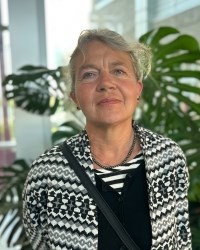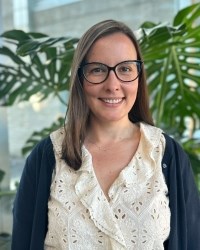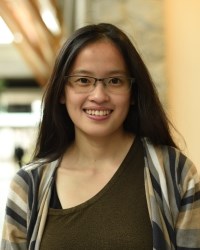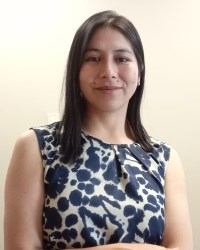Students and faculty from across Canada and around the world recently gathered at UNBC’s Prince George campus for the Arctic Academy for Sustainability 2023.
Following up on the first academy in Finland last August, the goal of this year’s interdisciplinary summer school was to provide participants with a deeper understanding of the issues raised by energy transition in the Arctic, including green energy transition, Indigenous rights and partner engagement principles explains organizer Professor Paul Bowles of UNBC’s Global and International Studies and Economics departments.
“It provided a great opportunity for graduate students at UNBC to learn with a group of graduate students and faculty from around the world,” he adds.
With funding from the Prince Albert II of Monaco Foundation, faculty instructors facilitating the Arctic Academy are all members of the UArctic Thematic Network on Arctic Sustainable Resources and Social Responsibility (ASRSR).
“It was wonderful opportunity for us with the network and the Arctic Academy organization to have the opportunity to come to British Columbia, to Prince George – where distances are big,” says ASRSR Lead Karin Buhmann, who is a professor of Business and Human Rights in the Copenhagen Business School in Denmark.

“We were invited to go to the Doig River First Nation, but could not due to the forest fires, so we were very grateful when leaders from the commuity came here,” says Buhmann. “It was one of many opportunities for different perspectives to come together and we have the students – PhD and master’s students – ask questions from each of their perspectives, so everyone learned from the questions that were asked – bringing up knowledge and sharing new insights – and I think we, as faculty, learned, as well.”
Twelve graduate students were accepted into this year’s program, including two from UNBC. Six graduate students in UNBC’s International Studies program took an intensive preparatory course to broaden their knowledge of the North and sustainability issues in the region in advance of the Arctic Academy, so they, too, could participate.
In addition to the session with members from the Doig River First Nation, the academy featured a keynote lecture from Chief Joe Alphonse of the Tšilhqot’in National Government on Indigenous worldview and Aboriginal title; presentations on sustainability research underway at UNBC; student poster presentations and a facilities tour at Canfor’s Northwood Pulp Mill.
“I found it so rewarding to come together with so many different people from around the Arctic and beyond the Arctic,” say Agricultural University of Iceland PhD student Maria Wilke. “We all have some sort of connection to Arctic landscape or people.”
“I work with human rights more from a corporate responsibility perspective,” says Jacqueline Tedaldi, a PhD candidate at SDU – University of Southern Denmark’s Centre of Law, Sustainability and Justice.

“It’s really interesting to see how First Nations, for example the Doig River First Nation, how they’re actually getting their rights respected," she says. "And this huge paradigm change that they were talking about where now they can actually take ownership over project proposals that are coming into their land and what does sustainability look like in the future and governance from an Indigenous perspective.”
UNBC student Ann Duong is a PhD candidate in UNBC’s Natural Resources and Environment Studies (NRES) Graduate Program, researching industrial hygiene.

“The academy featured a considerable number of participants with backgrounds in law, policy and social sciences,” says Duong. “The conversations and discussions really offered insights into ways to empower younger generations to create a more significant positive influence within their communities and to become involved in leadership positions.”
Duong says she plans to apply the knowledge and skills gained to her research underway at UNBC’s Northern Analytical Laboratory Services and well as to her work at Eco-Living Community, a non-profit organization that emphasize sustainability and resiliency in northern B.C.
Jhoan Chavez is also in the NRES program, pursuing a Master of Science degree. Chavez came to UNBC from Peru to further explore developing technologies, like pyrolysis. Her research is working to improve agricultural waste management while taking advantage of the inner potential of biomass for by-products like fuels, electricity production and more.

“I come from the continent’s tropical area, so getting into the Arctic Academy was a ‘must’ for me to broaden my understanding on the global impacts of climate change,” says Chavez. “I learned about the cumulative impacts of industry and climate change in the Arctic and the vulnerability that communities and ecosystems face as a result.”
Chavez says reductions in the extent and thickness of sea ice have put the Arctic at the centre of an energy transition process that requires careful navigation.
“Since the transformation of the Arctic represents an opportunity for some sectors like mining, which will increase energy demands,” she says. “This creates an urgent need for cleaner energy sources where technologies like pyrolysis and renewable energies would play a critical role.
“Specifically for my research, the academy was an opportunity for me to analyze whether technologies like pyrolysis are feasible in the North and identify potential impacts on local communities,” says Chavez.
“In addition, I consider it my responsibility to find ways to promote a conservative energy and mineral extraction plan for the Arctic, while high-performance technologies and processes under development could potentially reduce environmental impacts, ecosystem risk and social implications in the near future.”
There will be two further Academies, in Newfoundland (2024) and Copenhagen (2025).
Read the original news at the UNBC website.
